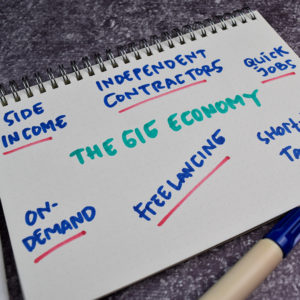When California voters approved Proposition 22, they sent a clear message to lawmakers: protect flexible work.
Many independent contractors breathed a sigh of relief at this victory, which allows some gig economy workers to operate independently, without being reclassified as “employees.”
However, the war being waged against independent contractors in California and across the nation is far from over.
Flexibility motivates an overwhelming majority of independent workers, especially those who must balance other priorities such as caregiving. For them, the freedom of being an independent contractor outweighs the benefits of being an employee.
For example, Kathy, a Lyft driver in California, is her husband’s primary caretaker. His condition, which required 20 surgeries in the past five years, and her own health issues limit her from working a full-time job, but she is able to earn a living through ridesharing.
Similarly, 68-year-old Karen might have lost her home if not for income from DoorDash, because home-health nursing did not generate enough work to meet her financial obligations.
These women can continue to work as independent contractors because a majority of California voters (58 percent) approved Prop 22. This ballot initiative exempts some gig economy companies such as Uber, Lyft, Instacart, Postmates, and DoorDash from Assembly Bill 5 (AB5).
This is the notorious state law, which went into force at the start of 2020, and requires companies to reclassify most independent contractors as employees. Under AB5, gig economy companies must comply with labor regulations and provide benefits such as health care, paid leave, and worker’s compensation.
Proponents — often led by union organizers that don’t want competition from non-traditional workers —argue that independent contracting jobs aren’t good jobs. That everyone should have full schedules and full benefits.
But this ignores the diversity of workers’ needs and the very real costs of these benefits.
The companies estimated that AB5 would drive labor costs 20-30 percent higher, and they would be forced to make unpleasant business decisions that would erode drivers’ flexibility (and hurt consumers) such as instituting shifts, scheduling drivers in advance and reducing the number of drivers during slow hours or in less busy markets.
For workers like Karen and Kathy, this would force them out of the labor force. According to a report by Upwork and Freelancers Union, 46 percent of freelancers depend on contract work because their personal circumstances prevent them from working in traditional jobs.
Prop 22 has its limits. It only applies to select gig economy companies, while AB5 applies broadly to all independent contractors.
So far, over 100 occupations have been exempted from AB5 because workers in these occupations had the deep pockets to lobby or the megaphones to pressure lawmakers into granting them carve outs. Individual workers in non-exempt professions, who lack resources or platforms, remain under the stranglehold of this law.
Many news stories have emerged about the harms caused by AB5 such as men and women losing projects, reliable clients, and incomes, and finding no new opportunities.
Out-of-state clients have stopped hiring California independent contractors as well. The COVID-19 pandemic only exacerbated all of this hardship.
That was the situation for graphic designer Kevin Barnard, who lost an out-of-state client that would have paid him $25,000-$35,000 and is now living off his dwindling savings.
This hardship is spilling across borders. AB5 has become a model for other states such as New York, New Jersey, and Illinois, which introduced or are considering copycat legislation.
Most worrisome, the U.S. House of Representatives passed the Protecting the Right to Organize (PRO) Act this year, which copied AB5 and would effectively reclassify all independent contractors as employees.
If it became law, the PRO Act would undoubtedly leave millions of the nation’s 57 million freelancers unemployed, perhaps indefinitely. Joe Biden and Kamala Harris, who both supported AB5, promise to enact the PRO Act and crack down on independent contracting.
Over 10 million workers are unemployed. We need a robust economy that generates flexible opportunities that fit the unique circumstances of American workers even as we continue to battle the pandemic. Lawmakers should stop trying to force workers back into the outdated employer-employee model.
Prop 22 protects flexibility for some of California’s gig economy workers, but the work will not be done until every independent contractor in California is free from the grip of AB5 and every one of the nation’s independent contractors no longer has a target on his or her back.

